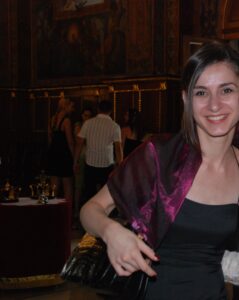Meet Our New Wadsworth International Fellows: Ana Majkic
 In the next installment of our series on 2013’s new cohort of Wadsworth International Fellows, we meet Ana Majkic, a Serbian archaeologist who studied at the University of Belgrade and will now be embarking on doctoral studies at the University of Bordeaux 1.
In the next installment of our series on 2013’s new cohort of Wadsworth International Fellows, we meet Ana Majkic, a Serbian archaeologist who studied at the University of Belgrade and will now be embarking on doctoral studies at the University of Bordeaux 1.
During my studies of archaeology at the University of Belgrade, Serbia, I have focused on Paleolithic archaeology and developed a special interest on hominins’ cognitive abilities. I was, in particular, fascinated by the debate on the emergence of symbolically mediated behavior (SMB) and modern cultures. My PhD research project is aimed to expand my previous work on the origins of SMB, by examining the earliest possible manifestations of symbolic behaviors in the Balkans, as evidenced in the archaeological record. I will accomplish this by analyzing different categories of material culture – pigment, engraved and perforated objects, personal ornaments – from a number of the Middle and Early Upper Paleolithic sites in Serbia and adjacent regions. A variety of analytical techniques, including optical microscopy, SEM, TEM, XRF, XRD, Raman, Pixe-Pige, will be applied to the study of this material. The equipment to conduct these analyses is available at the CNRS laboratory PACEA, affiliated with the University of Bordeaux 1, and on the campus of this University. Scholars working in this laboratory have the expertise to guide my training and research, and critically evaluate results stemming from my analyses. Dr. Francesco d`Errico’s extensive theoretical and analytical background on the emergence of symbolic behavior will guarantee a high quality education and facilitate the publication of the obtained results in international peer reviewed journals. This will allow inclusion of the relevant data from the Balkans into the wider debate concerning hominins cognition and origins of modern culture. The aim of my PhD research is to understand the time and mode of the emergence of symbolic behavior in the Balkans, and contribute, by building on such results, to the understanding of the events and processes that have led humans to develop such an innovative behavior in this region of Europe.
Congratulations again to 2013’s other fellows introduced in this series so far, Daniel Perera Bahamón and Elisabeth Kago Nébié! All the best luck to you on your studies and continuing career in anthropology!